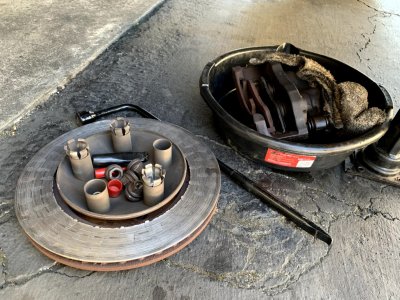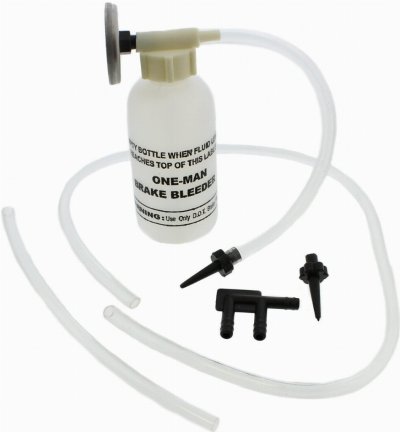Brian Meek
Member
Hi folks, I’m new to this forum and appreciate the benefits of your collective wisdom. In this post, I’m mostly looking for any tips or gotchas to avoid on refilling a mostly drained brake system.
Background story: My daughter, who’s away at College, has been driving our 2001 Expedition (5.4L; 4WD; EB). She reported brake noise to me after driving home. Me: “Brake noise? Since when? That’s seriously an urgent big deal! Blah blah!”. I figured it wouldn’t hurt to buy and install a new set of rotors & pads all around because she was likely hearing wear warnings from her brake pads for a bit too long and may have already scratched up a rotor. I ordered a set of rotors and pads.
Well, when we traded cars and I moved the Expedition to where I wanted to work, I noticed that the brakes were WAY too squishy. Then I noticed the fresh puddle of brake fluid under the right front wheel… Here’s what I found when I dug into the job:

Half the rotor’s gone! You can see the corresponding “pad remains” still in the removed caliper. Apparently the heat from this disaster melted some seals in the caliper causing the loss of fluid…. Needless to say, I then called my daughter to amplify my previous lecture.
So, I’ve ordered a set of remanufactured front calipers.
I don’t expect any challenges replacing the front calipers and the rotors & pads all around, but I’m a bit anxious about refilling and bleeding the hydraulic brake system after all that fluid drained out. Any recommendations on that process would be welcome.
Background story: My daughter, who’s away at College, has been driving our 2001 Expedition (5.4L; 4WD; EB). She reported brake noise to me after driving home. Me: “Brake noise? Since when? That’s seriously an urgent big deal! Blah blah!”. I figured it wouldn’t hurt to buy and install a new set of rotors & pads all around because she was likely hearing wear warnings from her brake pads for a bit too long and may have already scratched up a rotor. I ordered a set of rotors and pads.
Well, when we traded cars and I moved the Expedition to where I wanted to work, I noticed that the brakes were WAY too squishy. Then I noticed the fresh puddle of brake fluid under the right front wheel… Here’s what I found when I dug into the job:

Half the rotor’s gone! You can see the corresponding “pad remains” still in the removed caliper. Apparently the heat from this disaster melted some seals in the caliper causing the loss of fluid…. Needless to say, I then called my daughter to amplify my previous lecture.
So, I’ve ordered a set of remanufactured front calipers.
I don’t expect any challenges replacing the front calipers and the rotors & pads all around, but I’m a bit anxious about refilling and bleeding the hydraulic brake system after all that fluid drained out. Any recommendations on that process would be welcome.


